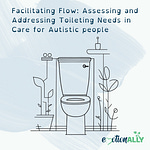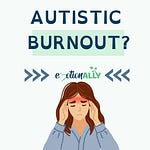One of the key pieces of legislation underpinning access to support for Autistic people in the UK is the Care Act, 2014. The lack of specificity in terms of threshold of need, and what constitutes “wellbeing” for Autistic people can mean that this legislation can be impenetrable for Autistic people who are engaging with social services. Neuronormative expectations, communication differences, fluctuating levels of care and support needs and insufficient triangulation, accommodations and focus on deficits can make it difficult for Autistic people to articulate the support they need and want.
This is the first in a series of articles designed to walk Autistic people and their loved ones through the legislation, each aspect of care need as outlined in this framework, the threshold for care provision and the difference between care and support needs. It is my hope that this will provide insight for Autistic folk and support for professionals assessing them.
The Law
The Care Act, 2014 applies to UK adults and aims to prevent and delay development of care needs, promote physical, mental and emotional health and support independence.
It focusses on person centred care that centres the wishes, needs and preferences of the individual in need of support, ensures local authorities have a duty to safeguard those who cannot safeguard themselves from abuse and neglect, and gives national thresholds for eligibility for care and support. It is also designed to recognise the contribution of unpaid carers and support them in their caring role.
It is of note that whilst the local authority has a duty to assess whether there are unmet care needs and what those are, but there is no compulsion to directly provide services and people may be signposted to third sector resources such as charities and any services that are provided can come with a charge to the service user. It may also be sufficient for the assessor to provide information and advice.
As per section 8 of the Care Act 2014,
“The following are examples of what may be provided to meet needs
• accommodation in a care home or in premises of some other type;
• care and support at home or in the community;
• counselling and other types of social work;
• goods and facilities;
• information, advice and advocacy.
• by arranging for a person other than it to provide a service;
• by itself providing a service;
• by making direct payments (more on which in a later article).”
The key people that should be involved include: the adult who may have care needs, any carers (with the individuals permission) and can include any adult with an interest in the adult’s wellbeing.
Key considerations should include, the impact on the adult’s wellbeing of any care needs (met or unmet), the outcomes that the adult wishes to achieve in day-to-day life, and whether, and if so to what extent, the provision of care and support could contribute to the achievement of those outcomes.
So what’s a care need?
Care needs relate directly to a physical or mental illness or impairment. Whilst I am not a fan of the wording, Autism is considered one such condition under the law. Essentially, any difficulties must be as a direct result of any disability, neurodivergent condition or illness.
• Needs that are assessed under the act include:
• Managing and maintaining nutrition.
• Maintaining personal hygiene.
• Managing toilet needs.
• Being appropriately clothed.
• Being able to make use of the adult's home safely.
• Maintaining a habitable home environment.
• Developing and maintaining family or other personal relationships.
• Accessing and engaging in work, training, education, or volunteering.
• Making use of necessary facilities or services in the local community, including public transport and recreational facilities.
• Carrying out any caring responsibilities the adult has for a child.
In order for there to be a “need” under the act “As a consequence [of the disability, condition or illness” there is, or is likely to be, a significant impact on the adult's well-being.” This means that a person cannot meet one of the above needs in the bullet pointed list without help, or if they can achieve it without help it takes significantly longer than would be “normally expected”, causes significant “pain, distress or anxiety” or endangers yours or others health and safety.
We’ll go into the application of “significant” for each area in later articles as this is obviously a matter of professional interpretation for the most part.
As you can see care needs are mostly related to physical needs, personal care and access to social and community support. Support needs are much wider, and are not covered under the legislation, anyone can have a support need. That may include support such as a befriending service, emotional support, of things you find challenging but are not as a direct result of any condition, disability or illness. For example struggles with executive function or lack of motivation to shower regularly would likely fall under the category of support need, inability to get in and out of the shower or wash your hair would likely be a care need. If you can do it with prompts, it’s likely to be a support need that can be addressed by support with routines.
#careneeds #careact #assessment #Autism #Autistic #socialwork #assessment #advocacy #selfadvocacy













Share this post